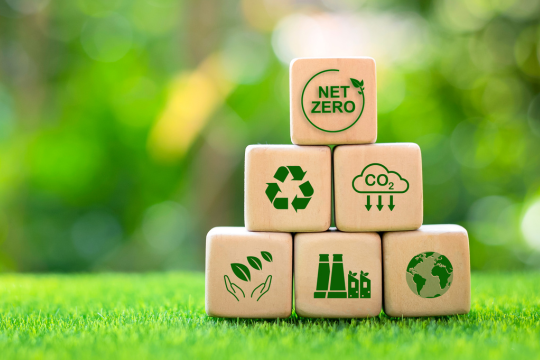The EU deforestation regulation (EUDR: regulation on deforestation-free products) is a central component of the EU's strategy for greater sustainability. It aims to prevent deforestation through trade in certain products. But what does the EUDR law actually mean for companies and who is affected? Here are the key facts.
What is the EU Deforestation Regulation (EUDR)?
.png)
The EU Deforestation Regulation (EUDR) aims to prevent products that contribute to deforestation from entering the European market . This primarily concerns raw materials such as
- Soy,
- Palm oil,
- Coffee,
- Cocoa,
- Wood,
- Beef,
- Rubber
Under the EUDR Act, companies must prove that their products have not been produced on deforested land since 2020. This applies to both producers and companies that import or process these raw materials.
The EUDR Scoping Tool helps you to identify whether your company is affected by the EU Deforestation Regulation.
What is the aim of the EU Deforestation Regulation?
The main objective of the EUDR law is to reduce global deforestation and forest degradation. Companies must redesign their supply chains so that no products from illegal or recently deforested areas enter the EU.

Deforestation and forest degradation contribute significantly to the climate crisis and the loss of biodiversity - two of the greatest environmental challenges of our time. According to the Food and Agriculture Organization of the United Nations (FAO), 420 million hectares of forest were lost worldwide between 1990 and 2020, an area larger than the EU. A further 10 million hectares of forest are destroyed every year, with 90 percent of deforestation caused by unsustainable agriculture.
Deforestation-free supply chains are therefore an important measure for climate protection and the preservation of biodiversity.
EUDR from when? - The deadlines for implementation
The EU Deforestation Regulation was originally due to come into force on December 30, 2024. However, after months of criticism, the EU Commission has decided to postpone the regulation by one year. The EUDR will come into force on December 30, 2025 for large companies and on June 30, 2026 for micro and small companies. From then on, only products that meet the requirements of the EU Deforestation Regulation may be sold.
EUDR - Who is affected?
The EUDR law affects all companies that trade products or raw materials on the EU market . The EU Deforestation Regulation distinguishes between:
- Market participants: Companies that import or export relevant products to the EU market for the first time.
- Distributors: Companies that sell relevant products in the EU market
Large and medium-sized companies would be affected by a final postponement from the end of 2025 if they meet at least two of the following three criteria:
- > 50 employees
- > € 10 million turnover
- > € 5 million balance sheet total
Small and micro-enterprises would be affected by the EU Deforestation Regulation from mid-2026 according to the following criteria
- < 50 Mitarbeitende
- < 10 Mio. € Umsatz
- < 5 Mio. € Bilanzsumme
What conditions must products meet under the EUDR?To meet the requirements of the EU Deforestation Regulation, companies must prove that their products:
- were produced without deforestation (proof of origin),
- have been produced in accordance with the applicable laws of the country of origin,
- and have a declaration of due diligence.
Exceptions are 100% recycled goods, bamboo products, operating instructions or packaging materials. In addition, all products that were placed on the market before December 30, 2024 are exempt from the regulations (transitional regulation). However, this does not apply to wood products that were previously covered by the EU Timber Regulation. The Federal Office for Agriculture and Food (BLE) is responsible for implementing the EUDR Regulation.
Connectionof the EU deforestation regulation to the CSRD
The EU Deforestation Regulation and the Corporate Sustainability Reporting Directive (CSRD) pursue the same goal: to promote sustainability and transparency in companies. The CSRD requires companies to report comprehensively on their environmental and social impacts . The EUDR complements these requirements by ensuring that no products at risk of deforestation enter the EU. Companies already implementing the CSRD can use many processes to comply with the EU Deforestation Regulation, as both regulations focus on sustainability and transparency.
EUDR - opportunities and challenges for companies
The implementation of the EU Deforestation Regulation presents many companies with challenges, but also offers opportunities. Those who adapt their supply chain at an early stage can secure a competitive advantage through greater transparency and sustainability. However, companies must strictly monitor their supply chains, provide evidence and hold suppliers more accountable.
Step-by-step to EUDR compliance - your guide
Implementing the EUDR law may seem complex, but a structured approach helps companies to manage the process efficiently. Here's how to implement the EU Deforestation Regulation step-by-step:
.png)
- Data collection
Get an overview of your raw materials, including quantities, suppliers and countries of origin. In addition, the EU Deforestation Regulation requires the geolocation of all land on which the raw materials have been produced since 31 December 2020. This proves that no deforestation has taken place and that all legal requirements of the country of origin have been met. - Risk assessment
Assess the deforestation risk in your supply chain based on factors such as country of origin and political stability. Use the EU's benchmarking system to categorize producing countries by risk class. Only products from low-risk regions may be imported into the EU. - Risk mitigation
Identify risks in your supply chain and reduce them by working with suppliers. Implement a code of conduct and technical control measures to make the supply chain more transparent and secure. Monitor processes regularly. - Documentation and reporting
Each affected product batch requires a due diligence declaration confirming compliance with the EU Deforestation Regulation. This declaration is checked by the customs authorities. Companies (except SMEs) must also publicly report on their risk assessment and measures taken.
It is important that your processes are regularly adapted to new developments in the EU deforestation regulation. Review your supply chain continuously to identify risks at an early stage. Stay in close contact with your suppliers and optimize your measures.
HowPlanted helps with the implementation of the EUDR regulation
With Planted's ESG software, we support your company in designing your deforestation-free supply chain. Our tool makes it possible to efficiently collect, analyze and report ESG data - both for the EUDR and the CSRD. In addition, we actively promote the protection of biodiversity: companies can plant their own company forest or protect local forest areas.
Wouldyou like tofind out more? Book an appointment now with our team of experts now.





